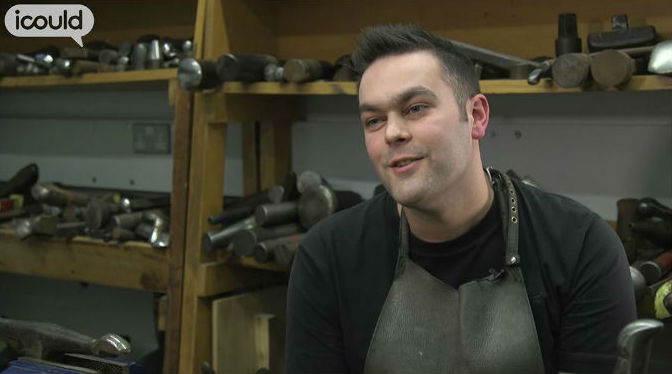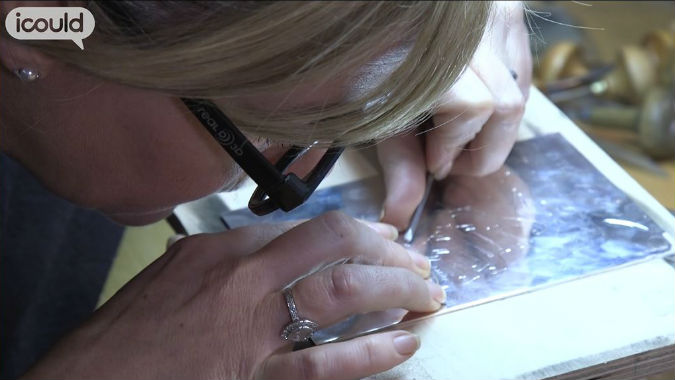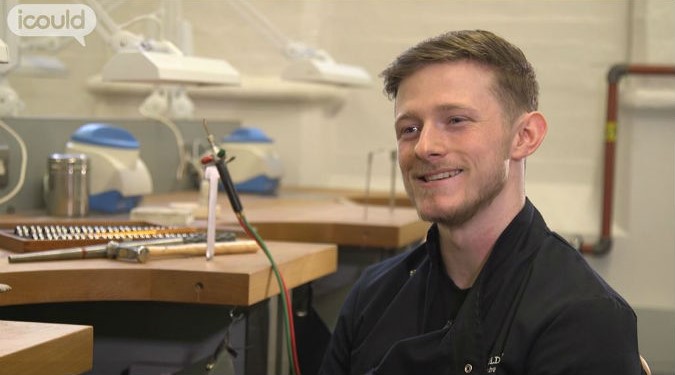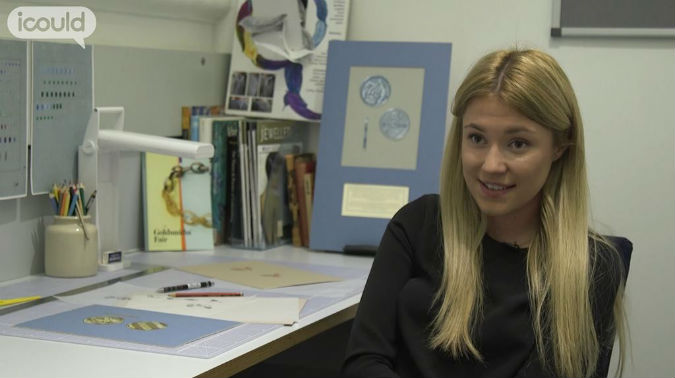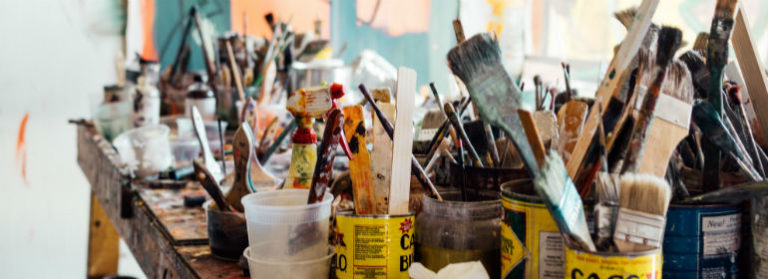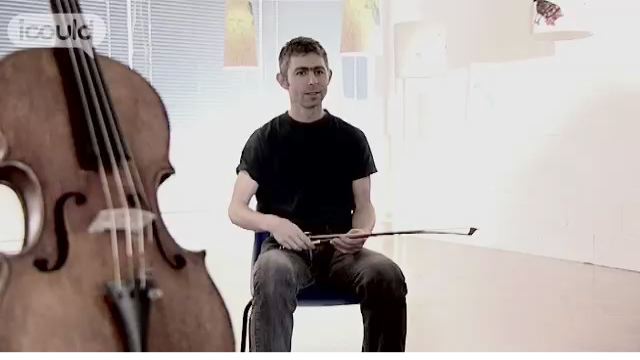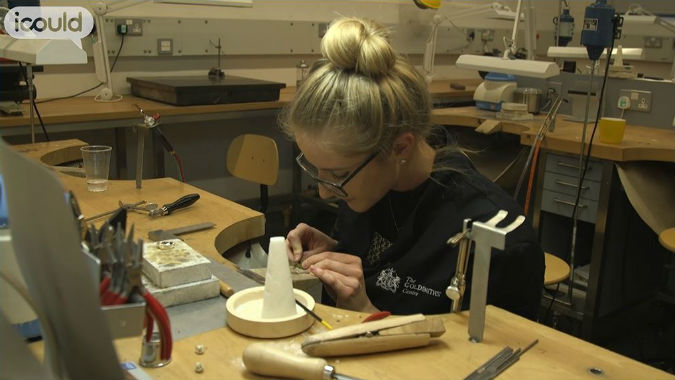Explore: Design and skilled crafts
Silversmith
Clive Burr Silversmiths and Goldsmiths
info Issues viewing the video?
| Time Code | |
| 00:00 | Caption
Paul, Silversmith |
| 00:00 | My name’s Paul Savage. I am a goldsmith and I work for Clive Burr, goldsmith and silversmith in The Goldsmith’s Centre. I have been doing it for nearly 14 years. |
| 00:11 | I wouldn’t say I really enjoyed school. I got on with it. I generally enjoyed the more practical subjects, art, design and technology, and I found the teachers from that background quite supportive. Wasn’t really interested in staying on and doing A levels or going to university. I wanted to work with my hands and I stumbled across some courses at various colleges and someone suggested about an apprenticeship. |
| 00:41 | I should have been studying for my GCSEs but I decided to use my Easter holiday to take on a 2 week trial at Clive’s workshop and at the end of the 2 weeks Clive offered me an apprenticeship and that’s where it all began. |
| 00:57 | To start with it was a big change. Obviously coming from school and they almost, in a way, wrap you up in cotton wool because they don’t prepare you for the big, wide world. As difficult as it was to really get into it, it was also very, you know, I felt like I had the full support of my boss and the guys in the workshop. |
| 01:20 | On completing my apprenticeship, I did my masterpiece, which is your piece to basically be judged and that ends your apprenticeship and you become a full scale craftsman, I suppose. You’re then classed as being fully trained. It was a private commission for a syndicate of clients who commissioned a model of a silver Swiss chalet. You are then responsible for organising that whole job. It felt quite strange as an apprentice, but it was a test and at the time I was cursing, but looking back, it did me a hell of a lot of good. |
| 02:03 | You need to have a good eye for detail. You need patience. As an apprentice you may make something 4 or 5 times until it’s right, because you’re allowed that time to do that. In a commercial workshop, when you’re a fully trained smith or jeweller, you’re not allowed that time. What gets me out of bed is basically the fact that I like a challenge and I like coming in and working on a piece and seeing it through to the end, turning a basic piece of metal into something. |
| 02:37 | I think everyone that has had some sort of input into my training and my career, yeah they’re the ones that really have pushed me forward and inspired me and that inspires you to be, you know, better than them basically. Part of teaching makes you want to push the guys that you’re teaching to be better than you are because you want to see them, you know, succeed. |
| 03:04 | I would say you’ve got to really push yourself hard and go for it and really get the most out of every opportunity that’s put in front of you. |
| 03:17 | END |
“You need to have a good eye for detail. You need patience.” Paul preferred practical subjects at school but wasn’t really interested in staying on after his GCSEs. Following a two-week trial during the Easter holidays, he was offered an apprenticeship and is now a fully-qualified silversmith.
More information about Other skilled trades n.e.c.
Data powered by LMI For All
£27,560
average salary
The UK average salary is £29,813
39
average weekly hoursThere are 37.5 hours in the average working week
51%
male
49%
female
The UK workforce is 47% female and 53% male
Future employment
Future employment
Description
Job holders in this unit group engrave jewellery and stoneware, make artificial hairpieces, charge fireworks and munitions with explosive material, make lampshades, wickerwork, toys, dolls, models, candles, artificial flowers, other fancy goods, make patterns for moulds for metal castings, make and tune musical instruments, craft precious metals and stones, and perform other hand craft occupations not elsewhere classified in MINOR GROUP 544: Other Skilled Trades.
Qualifications
There are no formal academic entry requirements. Training is typically via apprenticeship or through specialised courses. NVQs/SVQs are available in some areas.
Tasks
- Uses hand or machine tools to engrave letters, patterns and other designs on jewellery and stoneware
- Constructs and covers wire frames for lampshades
- Makes wigs, beards and other artificial hairpieces from human hair or synthetic materials
- Interweaves canes of willow, withy, bamboo, rattan or similar material to make baskets and other pieces of wickerwork
- Charges fireworks, cartridges and other munitions with explosive material
- Makes children’s toys, dolls, models, candles, artificial flowers and other fancy goods
- Makes, maintains and adapts surgical and orthopaedic appliances
- Makes patterns for moulds, fits metal castings, pours plaster, fills plaster mould with resin and smooths surface
- Makes musical instruments, makes and assembles parts for musical instruments, and tunes to improve pitch, tone and volume
- Makes and repairs jewellery and decorative precious metal ware, sets, cuts and polishes gemstones and makes master patterns for articles of jewellery
Employment by region
Top 10 industries for this job
Other manufacturing
8491
Retail trade
6087
Construction
4193
Sale of motor vehicles
3731
Sport & recreation
3613
Metal products
2616
Rubber & plastic
2258
Services to buildings
2217
Other personal service
1701
Film & music
1629
Employment status
Related career stories
⇦
⇨


